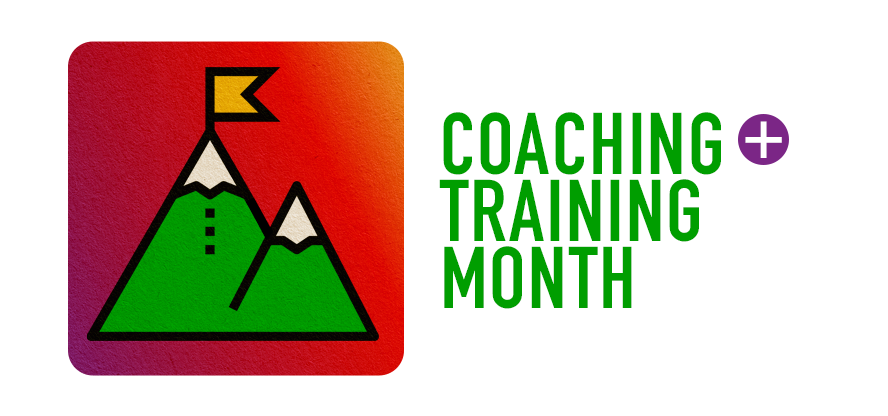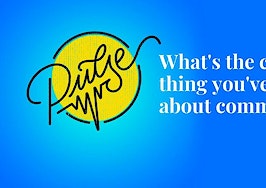 With the new year about to dawn, it’s time to level yourself up. We’ll close out the year with a monthlong focus on real estate coaches and the value of ongoing training. Expect advice from the top real estate coaches, deep evergreen training resources and more during Inman’s Coaching and Training Month.
With the new year about to dawn, it’s time to level yourself up. We’ll close out the year with a monthlong focus on real estate coaches and the value of ongoing training. Expect advice from the top real estate coaches, deep evergreen training resources and more during Inman’s Coaching and Training Month.
Coaching is one of the most powerful ways to boost performance, provided you find the right coach for you. While most real estate coaching focuses on lead generation and tracking your numbers, a Master Certified Coach focuses on helping you to capitalize upon your unique strengths to overcome the challenges that currently hold you back.
Byron Van Arsdale, the co-owner of RealEstateCoach.com, is a former broker-owner and Master Certified Coach (MCC) who has trained over 2,000 business and personal coaches. In today’s video, he walks you through the process of removing the obstacles that block peak performance. This is a radically different approach from “numbers coaching” or the “guru model” where “one-size-fits-all.”
What almost all coaching clients have in common
Most MCCs will ask you to bring a challenge you’re currently facing to your coaching interview. This allows you to “test drive the coach” and to see if you and the coach are a good fit for each other.
After doing coaching interviews for over 25 years, Van Arsdale reached an interesting conclusion:
The people who seek coaching have one thing in common. They always end up trying to solve the wrong challenge. We use a model called, “Symptom, Source, Solution” to describe this situation. The potential client is frustrated because they’re trying to change the symptom rather than the source of the symptom.
It’s like the old Whac-a-Mole Game. Every time you knock one down, another mole pops up. To stop that from happening, you must address the source. In the case of the game, simply unplug the machine and no more moles pop up. The idea here is that if you really understand what the real source of your challenge is, it’s usually pretty easy to solve.
Clients have selective memory about their own skills
One of Van Arsdale’s clients once told him, “I have trouble committing to my business.” This was just after she had spent almost two months getting her mom’s house ready for sale, working as the general contractor for all the work that needed to done, and then closing the deal.
This example illustrates how “selective memory” works. According to Van Arsdale,
When we take action in one part of our life, we often fail to see how it correlates to every other part of our life. The ability to demonstrate commitment or responsibility in one area is really the same in all your other areas. It’s your selective memory that tells you, “I’m good in this one part of my life, but I’m not very good in my business.”
Skills are transferrable
One of Van Arsdale’s other clients said, “I just can’t seem to figure out how to get my business going. I have trouble taking responsibility.”
He then asked, “Do you have children?” to which she replied, she had two grown children who are doing well. His response was:
“You already understand responsibility. As a mother, you understand deeply what it means to be responsible, committed, and caring. That’s not the issue.”
He then shifted the conversation to uncover the real source of the problem by asking her three questions.
- What do you think you have to do to succeed?
- What do you dislike doing?
- What do you like doing?
Her response was, “I’ve always been involved in the PTA.” Van Arsdale responded:
“Now you know exactly where to go market and to talk to people about your business.”
Stop being stopped by old stories
Van Arsdale’s coaching clients tend to be professional or executive women from their 40s to 60s. When one of them starts telling him a long-standing story about something that happened in the past, he responds by asking:
“How long have you been working on this challenge?”
If it’s more than a few years, he responds by saying:
“Okay, your statute of limitations has run out. You’ve had more than enough time to work on this story. It’s time to let it go, just put it to sleep, and not worry about it anymore.”
He explained:
In coaching, the goal is for the client to actually experience performance. Sometimes, I have to be really blunt and to the point. I don’t care why, and I don’t care if my client understands what really happened. The key is today, in this real estate market, can you perform? And that’s the bottom line.
This is the reason that the best coaches always ask a performance question at the end of the coaching session: “What is one action step you will take from being on today’s call?”
When the client doesn’t know what to do
Thomas Leonard, the founder of business and personal coaching, used a two-part approach to help clients get past, “I don’t know.” First, Leonard assumed that clients knew exactly what they needed to do. He viewed them as being fully functional, fully capable and fully resourceful.
When you assume that a client knows exactly what to do, you tend to ask different questions. Van Arsdale describes it like this:
When Leonard came across a client who would say, “I don’t know,” he would respond by saying, “Thank you. Tell me more” or “Thank you. What else?”
As a business or personal coach, you must be prepared to tell your client that they already know the answer. My role as a coach is simply to ask questions and to keep being persistent in a way that helps the client uncover the actual answer that solves their challenge.
What happens, and I’ve certainly seen this with my clients, is they’ll get to a level of frustration that suddenly causes their brain to reorganize and out of their mouth comes, “Well it could be this.” At that point they realize they do know the answer, even when they didn’t think they knew it before.
Two case studies
Van Arsdale shared two different case studies. In the first case study, his client had over 20 years of experience in the business but was caught up in thinking she had to be doing more blogging and video posts. Nevertheless, she kept telling story after story about how when she ran into someone or was connected via a referral, people immediately saw the value of working with her. The action step he gave her was:
Go out and talk to more people instead of worrying about blogging or doing video posts.
In other words, stop stalling and get out there and talk to people.
Here’s the second case study:
My second client had been a social worker for many years and decided to get into real estate. Because of her background, she provided her clients with a great customer experience.
During her first three years in the business, she sold $8 million worth of real estate. When I asked her about her goals for the coming year, she said, “I think $16 million would be pretty good.”
I made a rather off-hand comment: “I really thought you’d be going for at least $20 million,” due to how strong her performance had been the last year. At the end of the year, she ended up selling $24 million.
If she had stuck to her goal of $16 million, she might has reached $14 or $15 million, but by going for something beyond that goal, she achieved much more.
Clients don’t want to be told what to do
A substantial proportion of Van Arsdale’s clients will get on a complimentary coaching call and tell him, “Please tell me you’re not going to tell me what to do.” The reason for this is that these professional and executive women are already their own worst critic.
The one voice the client doesn’t need is someone telling them what to do. I tell them that my role is not to tell you what to do, but to clear out some of the things that may be distracting you or blocking your performance. It could be a habit that no longer serves you or taking action based upon a weakness rather than a strength.
What’s fascinating is how absolutely clear they are about what they want to accomplish. As I said earlier, what they need is someone who can ask the right questions that will unleash their performance.
The ‘guru’ or sports coaching model vs. the MCC approach of customizing coaching to fit the clients’ unique strengths and challenges.
Here’s how the “guru” or sports coaching model differs from the approach of someone who is a Master Certified Coach.
In guru model or sports coaching model, the coach has “been there, has done it, they know the lay of the land, and they know what to do.” This approach works, but it’s not very effective for those who are highly individualistic and want to do it their way rather than what some expert tells them to do.
On the other hand, when the coach sees the client as being fully capable, fully functional, and fully resourceful, then when someone tells me, “I’ve only been in the business for four weeks,” I don’t care about that.
Instead, I want to know who they are and what they’ve done. I want to know what their background is and how they can use those skill sets they developed over time to apply to their real estate business and how they can take action to move forward.
The bottom line is that both approaches work, you just need to figure out which one is right for you.
MCCs interview the client to determine if they’re a good fit for the coach’s business
The complimentary coaching session is designed for both the potential client and the coach to determine if they will work well together. Van Arsdale outlined the three things he looks for on his complimentary coaching calls to make this determination.
I can usually tell in one to three minutes whether a potential client is a good fit for me. I can usually identify the real challenge they’re really working on, not the symptom they described at the beginning of the coaching call. For me, it comes down to three things:
-
- Are they willing to own and be curious about the challenges they face?
- Are they willing to speak their truth to the coach?
- Is this person ready and willing to take action?
If you have the willingness to do those three things, you will probably have a very successful coaching relationship. Working with a coach is a lot like putting on a glove — it either fits or it does not fit. If the coach and you are not a good fit, keep looking.
The one sign that will tell you whether a coach is the right fit for you
Here’s how Van Arsdale says you can tell:
I’ve worked with clients and done client interviews for over 25 years now and it’s really pretty simple. If during the conversation with your potential coach, it really feels energizing, you start to see possibilities, and feel motivated to take action, that’s one of the signs that you have found a fabulous coach.
If you’re feeling ho hum about the session, however, that’s what I call flat. If you find yourself feeling disappointed or unhappy and your energy is decreasing, that coach is not the right fit for you.
One final point. Clients do outgrow their coaches. If you’re currently working with a coach, but the energy has gone flat or something else feels off, it’s time to reassess your relationship and search for a new coach who will once again make you feel excited and energized about your coaching relationship.
Bernice Ross, president and CEO of BrokerageUP and RealEstateCoach.com, is a national speaker, author and trainer with more than 1,000 published articles. Learn about her broker/manager training programs designed for women, by women, at BrokerageUp.com and her new agent sales training at RealEstateCoach.com/newagent.













